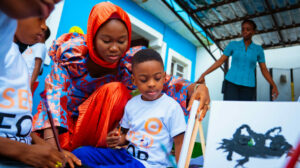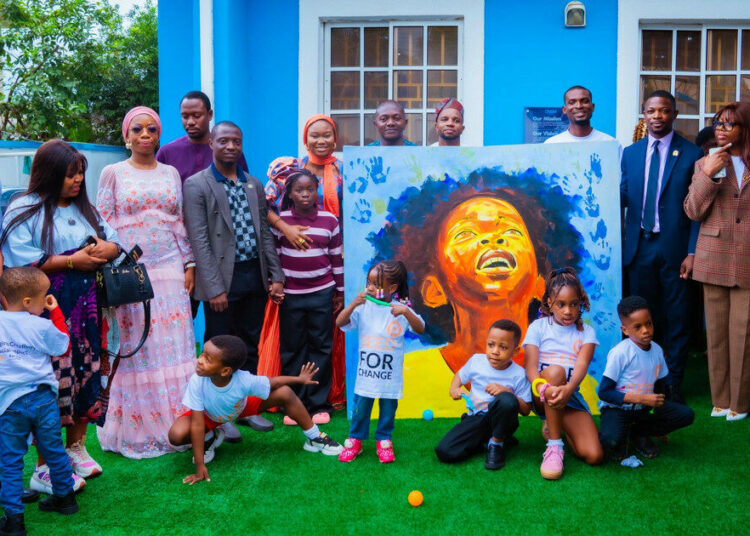The Federal Government has thrown its weight behind the Seed for Change Programme, an initiative of Revamp Initiative, as part of efforts to promote inclusion, creativity and support for vulnerable groups in Nigeria.
The support came during an outreach organised by Revamp Initiative at the RBM Autism Foundation in Abuja to commemorate this year’s World Humanitarian Day. The event, held under the Seed for Change banner, brought together children in the autistic community, parents, government officials and development partners.
Speaking at the occasion, the founder and Chief Executive Officer of Revamp Initiative, Ms. Taibat Ajiboye, said the programme was designed to give voice and visibility to marginalized communities while inspiring collective action to alleviate poverty and social exclusion.
She explained that her organisation deliberately chose to celebrate World Humanitarian Day with children living with autism to spread love through art and creativity, noting that the autistic community remains underserved despite government and non-governmental interventions.

“Despite different interventions by the government and NGOs, poverty is still on the rise in Nigeria. The marginalized people are still becoming clearer that there is something that needs to be done,” she said.
“Rome was not built in a day. That is why we are on this journey of alleviating poverty. We cannot say it would go completely, but we also should not wait for the government to do everything before we take action.”
Ajiboye stressed that humanitarian support should not be left solely to government, adding that individuals, civil society groups and the private sector also have a responsibility to lend a hand, no matter how small.
She also drew attention to the widespread knowledge gap about autism, especially in rural areas, where many parents often misinterpret the condition.
“A lot of parents, especially in remote communities, are not aware of autism. Most times they just think that their child is possessed or battling some spiritual problem,” she said.
“It is essential that we begin to advocate for autism in grassroots communities to create awareness so people do not just abandon their children. Dealing with kids on the spectrum can be challenging, but it requires love and collective support.”
Ajiboye added that Revamp Initiative will continue to work with relevant stakeholders to push humanitarian advocacy while providing relief to vulnerable families. She said the Seed for Change Programme symbolises the belief that “every seed would definitely lead to a change, and seeds will become forests of change very soon.”
Also, special assistant to President Bola Tinubu on Art, Culture, Tourism and the Creative Economy, Mr. Ayo Adeagbo, reaffirmed the federal government’s commitment to supporting creative and humanitarian initiatives.
Adeagbo praised Revamp Initiative for its sustained efforts in empowering marginalized groups, particularly through art and creativity, and assured of government backing.
“As a creative person, it is a big deal for me to be here because Revamp Initiative has been doing a lot in respect of humanitarian work—going to people in the slums, bringing up talent in the creative space,” he said.
“As special assistant to the President on Creativity, I feel it is important to show our support and let them know they are not just seen but also heard. We are here to let them know that the government is with them in everything they are doing.”
He disclosed that the Ministry of Art, Culture and Creative Economy has rolled out targeted policies to support people with special needs and integrate them into the national economy. According to him, President Tinubu recently approved the Creative Economy Development Fund to provide grants and loans for creatives across the country, regardless of background.
Adeagbo also highlighted ongoing infrastructural projects such as digital museums and cultural hubs, describing them as investments that would expand opportunities in the creative ecosystem.
“There is no creativity without money. That is why the government has set aside funds to support creatives. We are changing the narrative gradually and moving from old-school policies to digital-driven ones,” he said.
On his part, the special adviser to the Minister of Youth Development on International Cooperation and Non-Governmental Organisations, Mr. Marwan Gwamba, called for stronger community awareness to combat stigma associated with autism. He said the ministry was working with other government agencies to ensure the protection of young people, including those with disabilities.
Gwamba noted that the Nigerian Youth Help Desk, a toll-free platform established by the ministry, allows young people to report cases of discrimination, abuse and harassment, ensuring swift response from relevant authorities.
“The issue of stigmatization is not only limited to people living with autism. What we are pushing for is inclusion and protection of rights so that they can be seen as productive members of society,” he added.
This year’s World Humanitarian Day commemoration, anchored on Seeds for Change, underscored the need for sustained collaboration between government, civil society and individuals to bridge gaps in awareness, reduce stigma, and provide opportunities for vulnerable communities.











